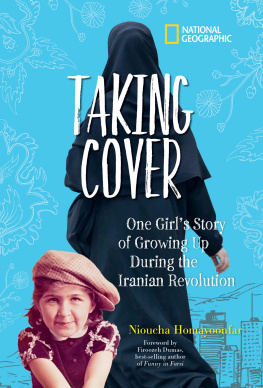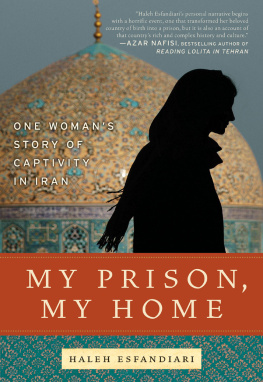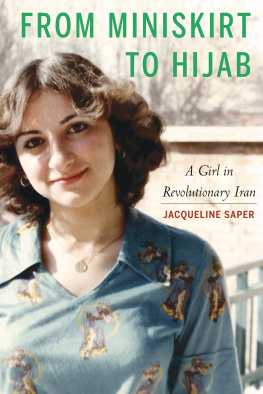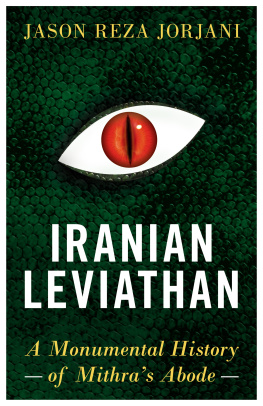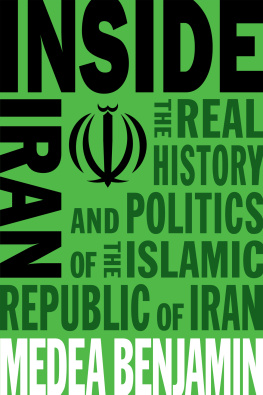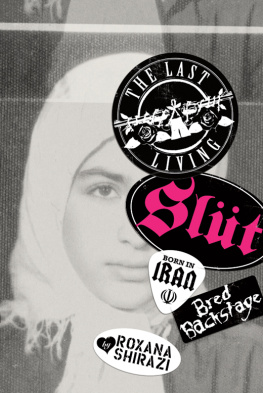When a bird realizes that it is other than the cage, it is already free.
T his book aims to convey what I experienced in Iran, particularly during my one hundred days in Evin Prison in 2009, when I saw the dark and bright sides of human nature, including my own. I hope this account can also help shed light on events unfolding in Iran, where many people have gone through similar or much more difficult ordeals, but few have been free to speak of them.
Although I tried to write as openly as possible, I omitted details that I believed could put others in danger or invade their privacy. In place of some names, I used either pseudonyms, which are marked with asterisks, or initials. I also altered the identities of certain cellmates, while attempting to keep them and their stories as true-to-life as possible. I received permission to use the actual names of a handful of my cellmates.
When referring to some intelligence agents and prison guards, I created nicknames because they never told me their real names. And after I was freed, I learned that the names of certain officials dealing with my case were likely pseudonyms.
In prison, I was prohibited from having a pen and paper, but I had plenty of time to review conversations and events over and over in my mind, and after my release, I spent much of the next several weeks writing down my recollections. Of course, memory has its shortcomings, and not all of the dialogue from my imprisonment is repeated verbatim here. Even so, I have reconstructed it, as well as the scenes in this book, as accurately as I could.
Before my arrest, I was writing a different book about Iran, where I had gone to work as a journalist when I was twenty-five. I had planned to stay for one or two years. But I became so captivated by the country that after nearly six years, I found myself still enjoying my life in Tehranunaware that I would soon be jolted out of my comfortable routine in ways I had never imagined.
CHAPTER ONE
T an pantyhose were selling for 1,000 tomans, assorted head-scarves for 2,000.
Red with white flowers, black with turquoise stripes! a plump woman hawker cried out as she pushed her way through the packed train car.
Like my fellow female passengers on Tehrans metro, I craned my neck to catch a glimpse of these $1 to $2 items, but all I could see from where I stood jammed in the corner were the backs of heads covered in mandatory hejab.
The metro screeched to a halt. Some women got off; others snatched up the vacated seats in our subway car, one of two set aside for female passengers who chose to sit separately from the men. I remained where I was, tired but content that with my trip to the holy city of Qom behind me, I had come one step closer to finishing the interviews for the book I was writing.
I hadnt intended to write a book when I moved from America to Iran nearly six years earlier, in February 2003. Instead, I wanted to get to know my fathers native land and its rich culture and history, learn the Farsi language, and realize my dream of becoming a foreign correspondent. Everything was going more or less according to plan when, in 2006, the Iranian authorities unexpectedly revoked my official press credentials.
I could have left Iran then, but I chose to stay. The loss of my press pass, I realized, might actually be an opportunity. I had gained more time to explore Iran, a country that remained exciting and mysterious to me and a place many outsiders seemed to misunderstand. And so I had decided to work on a book about life in Iran as seen through the eyes of a wide range of Iranians.
I believed if I didnt do this before leaving Iran, I would be too caught up in the next stages of my life to have another chance. Besides, I wasnt in a big hurry to go. I had fallen in love with Iran, had made many good friends, and for now, would have rather been here than anywhere else.
S everal taxis crawled by when I got off the metro at a bustling central Tehran square. They were all full. Since fuel rationing had begun in 2007 in this oil-rich, gas-guzzling nation, cabs seemed to have become harder to find on the streets.
My boyfriend, Bahman, had urged me to always use a taxi agency instead of privately owned taxis and shared cabs, in which total strangers often sat next to one another. I usually heeded his advice, but this evening, I just wanted to go home, take off my hejab, and unwind.
Darbast! (literally, exclusive) I shouted at an approaching four-door Peykan, Irans most popular car before it was discontinued a few years earlier because it was a heavy polluter.
Get in, said the driver, a young man with gelled hair and a tight T-shirt.
As we entered the highway, he cranked up the Iranian rap music on his stereo and began to hum along. It was one of those songs available only on the black market but largely tolerated by the authorities if played in private. I turned to look out my window. A gray cloud of smog hung in the air, obscuring the Alborz Mountains to the north of Tehran. If I hadnt known they were there, I would have thought they didnt exist.
So where are you from? the driver yelled over the music.
Iran! I yelled back. Although I had been an American citizen since birth, I was in Iran on my Iranian passport.
He turned down his music and glanced back at me. You look Japanese, he remarked.
Yeah, I said. My mother is Japanese.
Really? The Japanese are very hard workers.
My cell phone rang, saving me from going into any more detail about myself. Bahman was on the line. Even though he was visiting his sister in Los Angeles, he still called regularly to check on me. I gave him a rundown of my previous twenty-four hours, then we hung up the way we always did, with the words Dust-et dram , a term of affection meaning I like you or I love you.
Gradually, the car wove its way north up Sadr Highway, which Irans authorities had named, like many streets and freeways, after a martyr, this one, a grand ayatollah who had been executed by former Iraqi President Saddam Husseins regime. Since Irans 1979 Islamic Revolution, the Islamic Republic had tried to equate the idea of martyrdom, a concept highly revered in Shiite Islam, with self-sacrifice for the state. Many Iranians were lured to the front lines of the Iran-Iraq War in the 1980s with the promise that if they died, they would become martyrs and go to heaven.
I got out at my neighborhood grocery store, where I picked up the ingredients for my dinnersome eggs, fresh bread, and a bag of imitation nacho Doritos. The grocer smiled warmly at me as he handed me my goods.
My apartment complex sat at the end of an alley a block away, past a pastry shop, three fast-food restaurants, and several high-rises. When I walked through the front door, I found the elevator broken as it often was. On my hike up five flights of stairs, I bumped into the building caretaker, Gholam.
Miss Saberi, he said, is your heater working well? The weathers going to get colder soon.
My heater had been pumping out more cold air than warm, I informed him. He told me he would call the handyman.
As I unlocked my door and entered my apartment, giggling children burst out of one neighbors unit and chased each other down the stairs, while Voice of America Persian boomed from another neighbors illegal satellite TV.
I took off my long, black chador, which I had worn on my trip to Qom to blend in with the conservatively dressed local women, but instead of hanging the cloth on a hook as was customary, I returned it to its role of keeping the dust off my piano.



